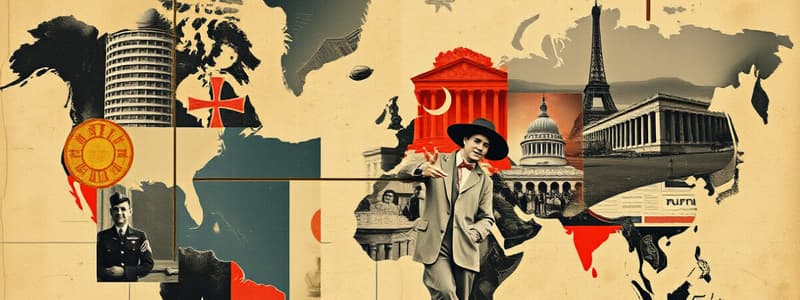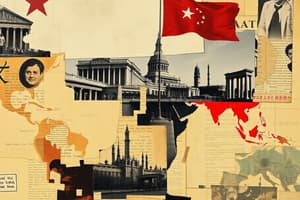Podcast
Questions and Answers
What describes a political system where two dominant powers exist?
What describes a political system where two dominant powers exist?
Which term refers to the use of restrictions to influence a state's behavior?
Which term refers to the use of restrictions to influence a state's behavior?
What is a characteristic of a unipolarity system?
What is a characteristic of a unipolarity system?
What does soft power primarily rely on to influence other states?
What does soft power primarily rely on to influence other states?
Signup and view all the answers
Which contemporary trend is characterized by an increased influence of non-state actors?
Which contemporary trend is characterized by an increased influence of non-state actors?
Signup and view all the answers
What is the primary focus of Realism in international relations?
What is the primary focus of Realism in international relations?
Signup and view all the answers
Which of the following is a key concept of Liberalism?
Which of the following is a key concept of Liberalism?
Signup and view all the answers
Which type of actor primarily possesses authority over a defined territory and population?
Which type of actor primarily possesses authority over a defined territory and population?
Signup and view all the answers
What is a significant challenge in addressing human rights on an international level?
What is a significant challenge in addressing human rights on an international level?
Signup and view all the answers
Which of the following concepts is associated with Constructivism?
Which of the following concepts is associated with Constructivism?
Signup and view all the answers
What is a major issue related to Climate Change in international politics?
What is a major issue related to Climate Change in international politics?
Signup and view all the answers
Which of these organizations is categorized as an International Organization?
Which of these organizations is categorized as an International Organization?
Signup and view all the answers
What role do Non-Governmental Organizations (NGOs) play in international politics?
What role do Non-Governmental Organizations (NGOs) play in international politics?
Signup and view all the answers
Study Notes
Key Concepts in International Politics
- Definition: International politics refers to the interactions between sovereign states, as well as between states and non-state actors, that impact global relations.
Theories of International Relations
-
Realism:
- Focuses on state interests and power.
- Assumes that states are rational actors in an anarchic international system.
- Key concepts: national interest, power balance, security dilemma.
-
Liberalism:
- Emphasizes cooperation and interdependence among states.
- Advocates for international institutions and norms to promote peace.
- Key concepts: democracy, free trade, international organizations.
-
Constructivism:
- Highlights the role of ideas, beliefs, and identities in shaping international relations.
- Argues that social constructs influence the behavior of states.
- Key concepts: norms, identity, social interactions.
Major Actors in International Politics
- Sovereign States: Primary actors with authority over a defined territory and population.
- International Organizations: Entities like the UN, NATO, and WTO that facilitate cooperation and governance.
- Non-Governmental Organizations (NGOs): Advocate for various causes and influence policy (e.g., Amnesty International).
- Multinational Corporations: Businesses that operate across borders and can affect international policy and economics.
Key Issues in International Politics
-
War and Conflict:
- Causes: territorial disputes, resource scarcity, ideological differences.
- Forms: conventional warfare, civil wars, terrorism.
-
Human Rights:
- Global norms and treaties aimed at protecting individual rights.
- Challenges: state sovereignty vs. international intervention.
-
Globalization:
- Economic, cultural, and technological interconnectedness.
- Impact on state sovereignty and local cultures.
-
Climate Change:
- Increasing recognition of environmental issues in international policy.
- International agreements like the Paris Accord.
-
Trade and Economics:
- Trade agreements and tariffs influence international relations.
- Economic sanctions as tools of foreign policy.
International Political Systems
- Bipolarity: Two dominant powers (e.g., Cold War era with the USA and USSR).
- Multipolarity: Multiple powerful states influencing global politics.
- Unipolarity: A single superpower (e.g., post-Cold War USA).
Tools of Foreign Policy
- Diplomacy: Negotiation and dialogue between states.
- Military Action: Use of force to achieve foreign policy goals.
- Economic Sanctions: Restrictions to influence state behavior.
- Soft Power: Persuasion through culture, values, and policies rather than coercion.
Contemporary Trends
- Increasing role of non-state actors in international relations.
- Rise of populism and nationalism affecting global governance.
- Digital diplomacy and cyber security concerns impacting international politics.
Key Concepts in International Politics
- International politics involves interactions among sovereign states and non-state actors, shaping global relations.
Theories of International Relations
- Realism:
- Centres on state interests and power as primary motivators.
- Views states as rational actors within an anarchic global system.
- Important concepts include national interest, power balance, and security dilemma.
- Liberalism:
- Stresses the importance of cooperation and interdependence among states.
- Supports international institutions and norms to foster peace.
- Key concepts include democracy, free trade, and international organizations.
- Constructivism:
- Focuses on the influence of ideas, beliefs, and identities on international dynamics.
- Suggests that social constructs shape state behavior and relationships.
- Important concepts include norms, identity, and social interactions.
Major Actors in International Politics
- Sovereign States: Central actors with jurisdiction over specific territories and populations.
- International Organizations: Bodies like the UN, NATO, and WTO that promote cooperation and governance.
- Non-Governmental Organizations (NGOs): Advocacy groups (e.g., Amnesty International) that influence policy and public awareness.
- Multinational Corporations: Enterprises that operate internationally, impacting economic policies and relations.
Key Issues in International Politics
- War and Conflict:
- Origins stem from territorial disputes, resource scarcities, and ideological divides.
- Manifestations include conventional warfare, civil wars, and terrorism.
- Human Rights:
- International norms and treaties aim to safeguard individual liberties.
- Encounter challenges balancing state sovereignty and the need for global intervention.
- Globalization:
- Represents economic, cultural, and technological interconnections across borders.
- Affects state sovereignty and the preservation of local cultures.
- Climate Change:
- Environmental issues are increasingly prioritized in international agendas.
- Includes global agreements like the Paris Accord to address climate challenges.
- Trade and Economics:
- Trade agreements and tariffs can significantly shape international relationships.
- Economic sanctions serve as tools to influence foreign state behaviors.
International Political Systems
- Bipolarity: Characterized by two dominant powers, such as the USA and USSR during the Cold War.
- Multipolarity: Involves multiple states with substantial influence over global politics.
- Unipolarity: Features a single superpower, exemplified by the USA after the Cold War.
Tools of Foreign Policy
- Diplomacy: Involves negotiation and communication among states to resolve issues.
- Military Action: The use of force to achieve strategic foreign policy objectives.
- Economic Sanctions: Imposed restrictions intended to alter a state’s behavior.
- Soft Power: Influencing other nations through culture, values, and policies rather than coercive measures.
Contemporary Trends
- Growing prominence of non-state actors in shaping international relations.
- Increased populism and nationalism influencing global governance and cooperation.
- Rise of digital diplomacy and cybersecurity threats affecting political dynamics globally.
Studying That Suits You
Use AI to generate personalized quizzes and flashcards to suit your learning preferences.
Description
Explore the fundamental theories and major actors shaping international politics. This quiz covers realism, liberalism, and constructivism, providing insights into state interactions and their impact on global relations. Test your knowledge and understanding of these key concepts in the realm of international relations.




